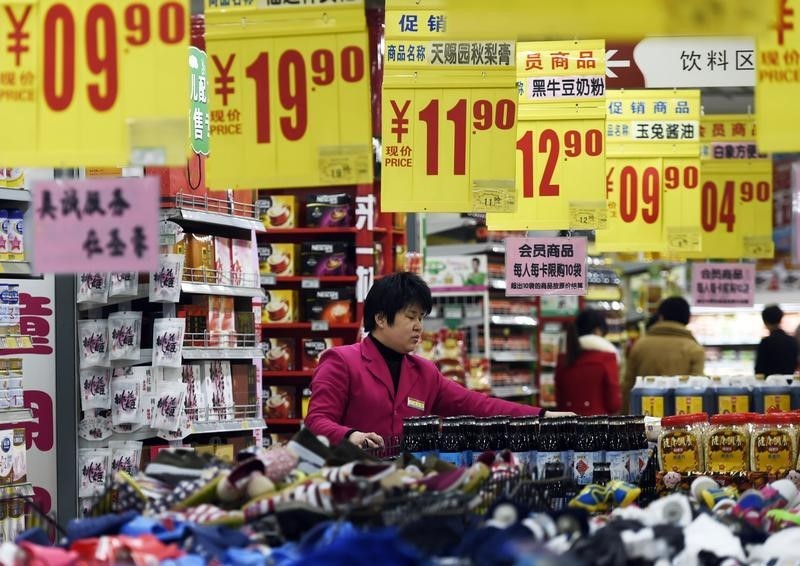Investing.com -- China, long hailed as a powerhouse driving global economic growth, is now facing a downturn in consumer confidence and spending, said analysts at Piper Sandler in a note.
The forces behind this shift—ranging from a troubled property market to a sluggish labor environment—are not only reshaping China’s domestic economy but also casting a long shadow over the global economic landscape.
"While weak housing & stocks depress confidence & consumption, Beijing is bent on keeping factories open," said analysts at Piper Sandler.
For years, real estate in China has been a cornerstone of wealth accumulation and economic vitality. However, as property values plummet and share prices remain under pressure, household wealth is shrinking, leading to a marked decline in consumer confidence.
This loss of confidence is directly translating into reduced consumer spending—a worrying trend for an economy that has increasingly relied on domestic consumption for growth.
Compounding this issue is China’s weak employment landscape. Persistent job market challenges are fueling uncertainty among consumers, who are responding by saving more and spending less.
In fact, savings rates have reached record highs, a clear indication of the pervasive anxiety among Chinese consumers about their economic future.
This is further dampening economic activity, creating a vicious cycle of low confidence, high savings, and sluggish spending.
The ramifications of China’s weak consumer base extend far beyond its borders, creating ripples across the global economy.
As Chinese consumers tighten their belts, the ripple effects are felt by countries and companies that have come to rely on Chinese demand as a key driver of growth.
Reduced consumer spending in China means lower demand for imports, which in turn affects global trade dynamics and stifles economic growth in other nations.
Moreover, China is currently facing an inventory overhang in both consumer goods and industrial commodities.
This surplus is not just a domestic issue; it poses deflationary risks for global markets as well.
With excess goods piling up, there’s a growing pressure to reduce prices, which could trigger a deflationary spiral in global markets, further exacerbating economic challenges worldwide, Piper Sandler said.
Luxury markets are also feeling the strain. China, once a major force in global luxury spending, is seeing a pullback in opulent consumption.
The Chinese appetite for high-end goods has diminished, posing challenges for luxury brands that have traditionally relied on the Chinese market for significant portions of their revenue.
As Chinese consumers become more cautious, these global luxury brands face declining sales and financial pressure, highlighting the far-reaching impact of China’s economic slowdown.
The automotive industry offers a stark example of the mixed effects of China’s economic downturn. While China’s robust portfolio of electric vehicles (EVs) is providing some momentum, the broader automotive market is struggling.
Weakened consumer spending, coupled with a strong “Buy Chinese” campaign, is creating a tough environment for foreign automakers.
This shift in consumer behavior is leading to a loss of market share for foreign brands and putting pressure on their profitability.
The consumer discretionary sector is another area where the impact is being keenly felt. U.S. companies with significant exposure to the Chinese market have seen their performance suffer as the downturn in Chinese consumer spending takes its toll.
The economic uncertainty in China is dragging down the financial results of these companies, underscoring the interconnected nature of global markets and the specific vulnerabilities of multinational corporations that are heavily reliant on Chinese consumers.
Amidst these economic challenges, China’s policy environment is leaning more towards regulation than stimulus. In recent months, the Chinese government has introduced a series of new regulations, rather than taking aggressive steps to stimulate growth.
This regulatory emphasis, while aimed at maintaining control, contrasts sharply with the need for economic stimulation in the face of a slowing economy.
The lack of substantial easing measures suggests that Beijing is prioritizing stability over aggressive economic expansion, even as growth remains sluggish.
In the long run, China faces formidable challenges. Several factors are weighing heavily on the economy, including the unwinding of the real estate bubble, worsening demographics, and a decline in foreign direct investment.
These structural issues are likely to persist, making it difficult for China to regain its former economic momentum.
While a financial crisis seems unlikely given the tight control exerted by the Chinese government, the ongoing pressures are likely to continue dragging on global growth, particularly for multinational companies that have counted on China as a key growth engine.
